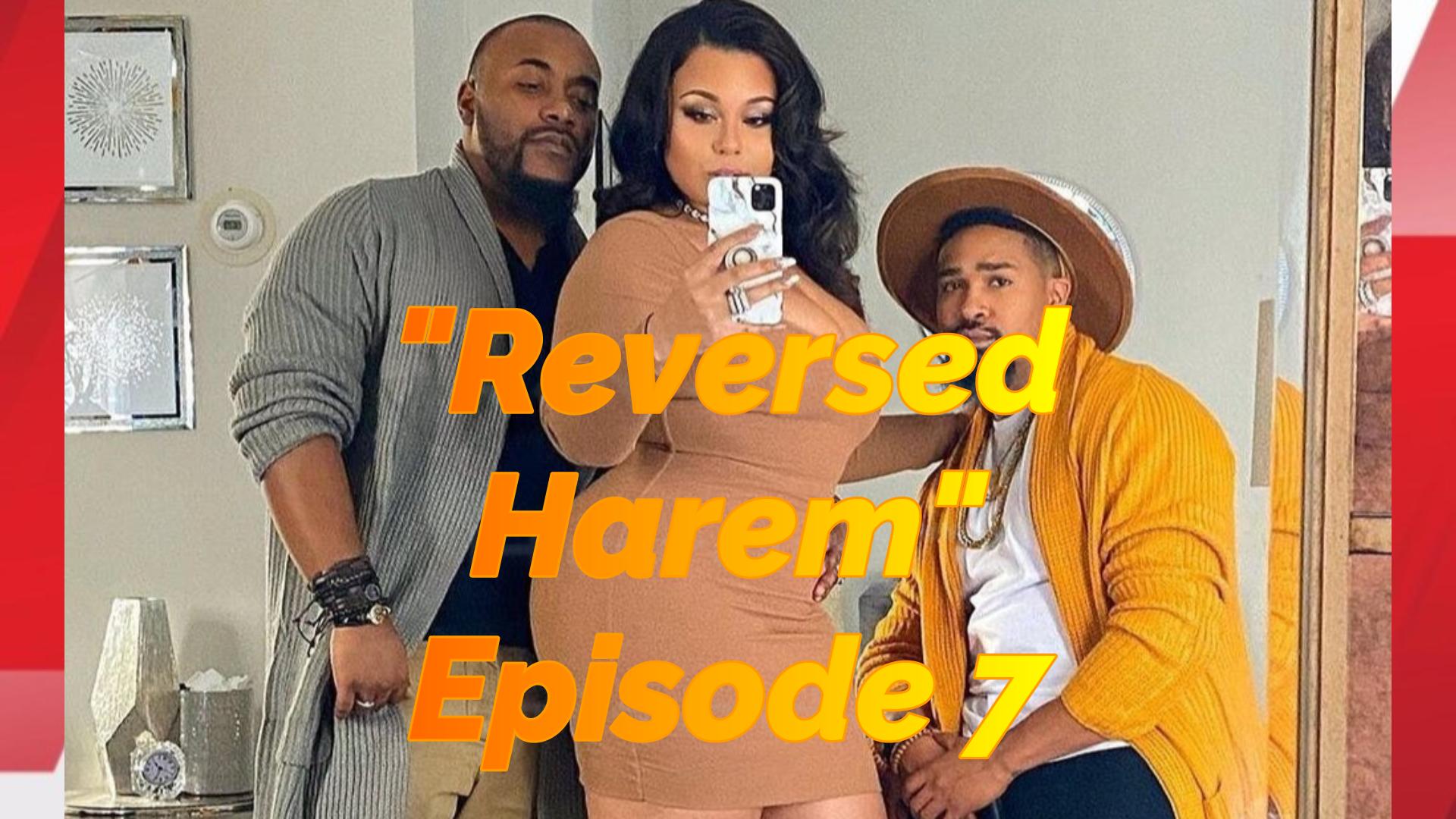January 1, 2023
Afro-Scope—The Magazine
(Directed By Harry Agina)
Greetings!
This is Afro-Scope, and we have episode 7 of our drama series on polyandry in Africa, which is titled, “Reversed Harem.” “What a man can do, a woman can also do,” even better sometimes. That’s the slogan for the series. And, so far, Lady Zalika seems to be living up to this maxim in Michael Shaibu’s “Reversed Harem.”
Now, Mikey will tell us what Lady Zalika has for her harem today, or what they have for her. We do know that she has not even married any of the guys in her harem. What she has so far is polyamorous relationships with the guys. Lady Zalika did ask the harem whether they want to get married, or finetune their present polyamorous relationship. That’s where we left them at the end of the last episode. They were at the dining table for dinner.
Whichever type of relationship that it turns out to be between Lady Zalika and her harem, the question remains; what next? That’s what we’re about to find out, and more, as “Reversed Harem” continues:
REVERSED HAREM 7
- INT. DINNING. DUSK.
OTIENO FINISHES CHEWING AND SWALLOWING, PICKS THE NAPKIN AND TOUCHES LIPS TO WIPE OFF IMAGINARY STAIN, THEN CLEARS HIS THROAT…
OTIENO: You know what? I think I should listen to what Mwangi and John have to say first, since they are already into this.
MWANGI: Hey! I think it is better for you to talk now that you have not yet committed.
JOHN: So do I, Tee.
ZALIKA: I too, Tee.
OTIENO REMAINS SILENT FOR A WHILE, TAKES A DEEP BREATH AND LETS OUT A SIGH…
OTIENO: By the way, does the position of the law matter in this? Is the law in support? I am asking because I don’t want to fall afoul of the law.
BOTH MWANGI AND JOHN TURN TO FACE ZALIKA ASKANCE…
ZALIKA: No one wants to run afoul of the law. But, in truth, I don’t know for sure yet.
BOTH JOHN AND MWANGI NOD…
OTIENO: And how about the marriage tradition? How do we plan to carry that out?
ZALIKA: Could you be a bit specific on that?
OTIENO: Like…what will it be: dowry or bride price?
JOHN: Well, in this case, it is obviously dowry.
MWANGI: Absolutely!
OTIENO: You guys cannot rush to say so yet. The customary laws dictate these things. In any case, whatever it is, who pays it to the family of whom?
BOTH JOHN AND MWANGI TURN TO FACE ZALIKA MATTER-OF-FACTLY…
ZALIKA (Smiling): Well, I don’t need to be told. But we must not forget: going through all that will make this arrangement fall into the line of the mainstream.
MWANGI: In which case…what?
ZALIKA: Well, back at the lounge, we talked about one spouse becoming submissive and even subservient in the traditional marriage settings.
OTIENO: Anyway…these are issues one needs to look at. Plus…the issue of jealousy.
JOHN/MWANGI (In unison): The issue of jealousy?
OTIENO ONLY SHRUGS BUT SAYS NOTHING…
ZALIKA: I am not jealous.
OTIENO: I am not referring to you. In fact, I am not referring to anyone in particular.
JOHN: Uh…if I may come in now… My family is already asking to know when I would bring a woman home.
MWANGI: My own Mom has been waiting to meet the woman I am dating.
ZALIKA: I am available. Let’s go anytime you are ready. Even this evening.
OTIENO: Well, since I need to make a commitment, let me now declare my position. I voiced some concerns while I was talking. The position of the law. The tradition: dowry or bride price. And who pays. If you don’t mind, Zalika, I think I want all these discussed well before I can commit.
ZALIKA: I quite appreciate your position, Tee. Thanks a million. Who can help research the position of the law? And who can help research the tradition?
OTIENO: I work with a law firm. I am a lawyer too. So I will do that.
ZALIKA (Appreciative): Thank you so much, Tee.
MWANGI: I will take up the tradition aspect.
ZALIKA: Thank you. And as for who pays…that would be me. I instituted all these. So who better to pay than me?
JOHN: Then how soon will the research results be ready so we can meet again?
OTIENO/MWANGI (In unison): Before noon tomorrow!
JOHN: Then I suggest we meet back here just after noon tomorrow.
ZALIKA: Do we all agree to that?
THERE IS GENERAL NODDING ROUND THE TABLE. ZALIKA NODS HER THANKS ROUND AT THEM TOO. THEY ALL RESUME EATING…
- INT. SITTING ROOM. DAY.
ZALIKA AND MWANGI ARE HAVING A DRINK AND CHIT-CHATTING…
ZALIKA: So what did you find out, Mwangi?
MWANGI: It varies from tribe to tribe. Some practice the dowry system while others practice the bride price system.
ZALIKA: You wouldn’t know what your tribe practices, would you?
MWANGI: Whatever it is, it’d have to be dowry now as things stand. Besides, being a man, I cannot be called a bride anyway. So how can a price be paid for my hand?
ZALIKA (Chuckles): Anyway, is there a given dowry rate?
MWANGI: Yeah! It is the equivalent of five years’ income of the one paying it. So, in this case, it’d be five years of your income.
ZALIKA: Wow! You’d love that, won’t you?
MWANGI ONLY SHRUGS AND BEGINS TO LAUGH. THEN ZALIKA’S PHONE RINGS AND SHE GETS IT…
ZALIKA (On the phone): Hello, Tee! … Yes, what did you find out? Is it legal here or is it illegal?
OTIENO (Filtered): The law is silent upon polyandry.
ZALIKA: Wow! And uh…how would interpret that to a lay man?
OTIENO (Filtered): That is to say that it is allowed…till it is formally not.
ZALIKA MAKES A FIST AND PUNCHES THE AIR IN HAPPINESS…
ZALIKA: Yes!
Now, Lady Zalika is triumphant. Most of the key issues have been resolved to her satisfaction. It has been agreed that she will actually marry her harem, and not polyamorous relationships. She has accepted to pay to marry her harem; just as it is done when a man marries a woman. This is where I bring in the matter of variations in African customs.
Yes, bride price is still paid in my own patriarchal Igbo tribe of Nigeria where men marry women. But there is a huge difference between my Igbo community of Nigeria in West Africa, and Lady Zalika’s tribe in East Africa. Whereas dowry is a whopping and whooping amount of the salary or income of five whole years in Zalika’s East African tribe, only a token sum is currently paid as bride price in my Igbo tribe of Nigeria, in West Africa. For us in that part of Nigeria, the dowry is now only to keep the custom alive. My people no longer virtually ‘sell’ out our women to their husbands. The bride price now goes as little as just one US dollar equivalent…just to keep the custom alive. However, even in the same Igbo tribe of Nigeria, there are communities that continue to virtually ‘sell’ their daughters in the name of bride price. All manner of demands are made of the groom, which he must fulfil before he can take his wife home. In some cases, the groom must build a house, or buy cars for the bride’s parents, in addition to a specified amount of cash money.
I don’t need to say that this often has very negative effects on the women who want to get married. The demands scare prospective grooms away. Some of the women wait too long before they finally get lucky with men who can afford all the bride-price demands. Unless, of course, when some of them revolt against the custom and elope with the men they love. Some women end up not getting married at all, because custom has priced them out of the reach of men. And of course, some of the men who can afford the bride price, often tend to treat the wives like property that they bought and paid for. In the case of Lady Zalika’s East Africa, we are talking about doling out five-years income to marry a man. Meanwhile, what does the person (man or woman) who pays such dowry or bride price live on, while he/she pays all his/her income to get married?
I must make the point that payment for a spouse (dowry or bride price) is not an African thing, No sir, no ma’am! Dowry is currently prevalent in South Asian countries, including Bangladesh, India, Sri Lanka and Pakistan. Note that I say ‘dowry,’ because, unlike bride price where men do the paying, it is women who pay the men to marry them. In a way, it is considered that the bride’s family gives money and property to her groom so that she would not have to depend on the groom’s family. It is also a show of gratitude to their son-in-law for choosing their daughter, thereby equating dowry with affection, love, and gratitude. You have probably have read or heard about bride-burning in South Asia. Brides are burned when her family refuses or is unable to pay additional dowry when needed by the groom,
I am Harry Agina, and this is where I take a bow for now.

